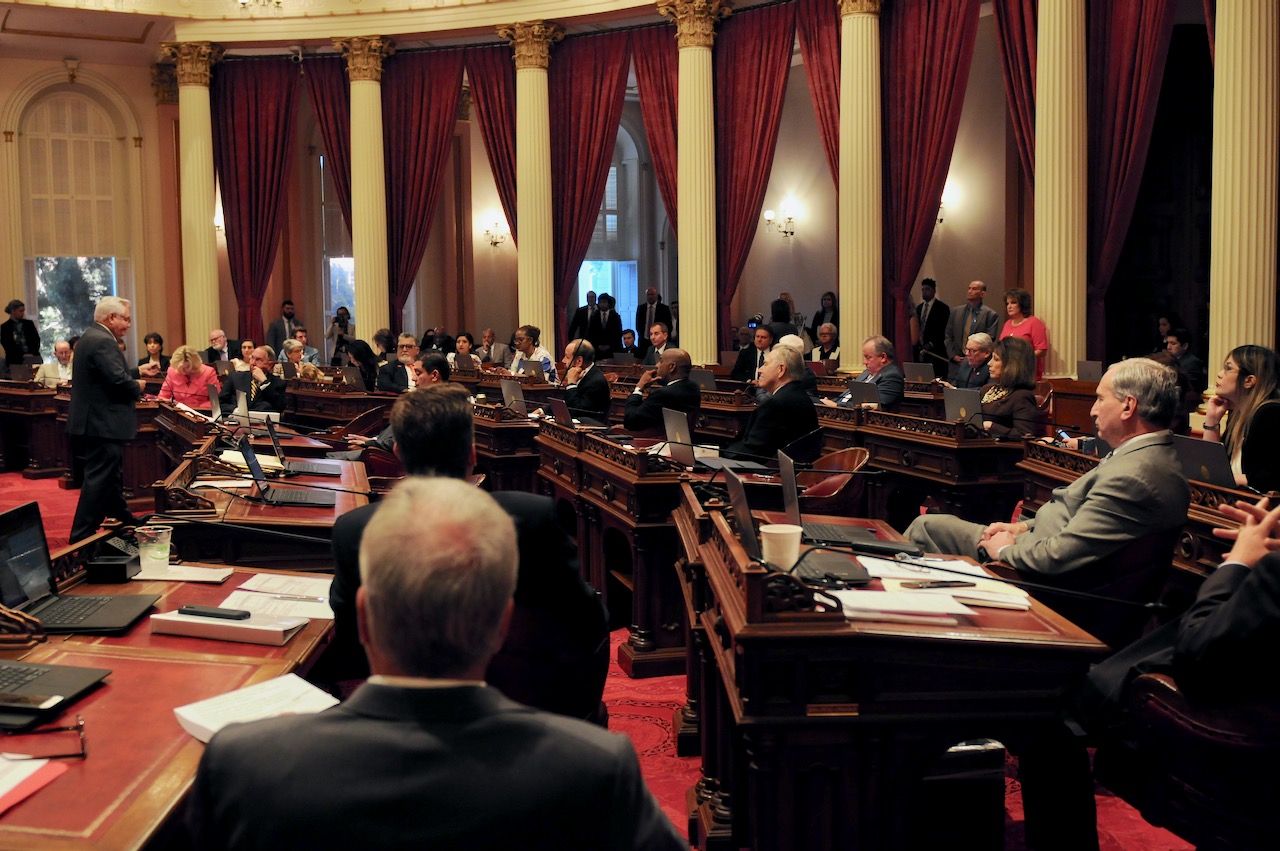
Justice Court. (Photo: Nirat.pix/Shutterstock)
California Trial Court Interpreter Employment
Requires trial courts to appoint trial court employees to perform spoken language interpretation of trial court proceedings
By Chris Micheli, August 26, 2022 3:23 pm
California has numerous formal acts in statute. Government Code Title 8, Chapter 7.5 provides the Trial Court Interpreter Employment and Labor Relations Act, which is contained in Section 71800 to 71829. Chapter 7.5 was added in 2002 by Chapter 1047. Section 71800 names the act.
Section 71801 provides definitions for the following terms: “certified interpreter”; “registered interpreter”; “cross-assign” and “cross-assignment”; “employee organization”; “mediation”; “meet and confer in good faith”; “personnel rules”; “personnel policies, procedures, and plans”; “rules and regulations”; “recognized employee organization”; “regional court interpreter employment relations committee”; “regional transition period”; “transfer”; and, “trial court.”
Section 71802 requires trial courts to appoint trial court employees, rather than independent contractors, to perform spoken language interpretation of trial court proceedings. An interpreter may be an employee of the trial court or an employee of another trial court on cross-assignment. However, a trial court may appoint an independent contractor to perform spoken language interpretation of trial court proceedings if one or more of specified circumstances exist.
In addition, a trial court may appoint an independent contractor on a day-to-day basis to perform spoken language interpretation of trial court proceedings if all of the specified circumstances exist.
Only registered and certified interpreters may be hired by a trial court as employees to perform spoken language interpretation of trial court proceedings. Interpreters who are not certified or registered may be assigned to provide services as independent contractors only when certified and registered interpreters are unavailable and the good cause and qualification procedures and guidelines adopted by the Judicial Council have been followed.
Section 71803 requires, in each trial court, there to be a new employee classification entitled “court interpreter pro tempore” to perform simultaneous and consecutive interpretation and sight translation in spoken languages for the trial courts. Unless otherwise provided in a memorandum of understanding or agreement with a recognized employee organization, certain provisions apply to employees in this classification.
Section 71804 requires each trial court to offer to employ as a court interpreter pro tempore each interpreter who meets all of the specified criteria. Section 71804.5 provides that, after a trial court has considered applications, the trial court may hire additional court interpreters pro tempore pursuant to the personnel rules of the trial court.
Section 71805 provides that, until the conclusion of the regional transition period, all interpreters who are employed by a trial court are classified as court interpreters pro tempore, unless otherwise provided in a memorandum of understanding or agreement with a recognized employee organization.
Section 71806 provides that, at the conclusion of the regional transition period, trial courts in the region may employ certified and registered interpreters to perform spoken language interpretation for the trial courts in full-time or part-time court interpreter positions created by the trial courts with the authorization of the regional committee and subject to meet and confer in good faith. The courts may also continue to employ court interpreters pro tempore.
Section 71807 specifies that, for purposes of developing regional terms and conditions of employment for court interpreters and for collective bargaining with recognized employee organizations, the trial courts are divided into four regions, as follows:
Region 1: Los Angeles, Santa Barbara, and San Luis Obispo Counties.
Region 2: Counties of the First and Sixth Appellate Districts, except Solano County.
Region 3: Counties of the Third and Fifth Appellate Districts.
Region 4: Counties of the Fourth Appellate District.
The Judicial Council is required to adopt rules for the creation and operation of a regional court interpreter employment relations committee for each region, composed of representatives chosen by the trial courts within the region. And, the Judicial Council may divide each region into smaller subregions for purposes of coordinating the cross-assignment of court interpreters.
Section 71808 requires the regional court interpreter employment relations committee to set terms and conditions of employment for court interpreters within the region, subject to meet and confer in good faith. These terms and conditions of employment, when adopted by the regional committee, are binding on the trial courts within the region.
Section 71809 requires the regional court interpreter employment relations committee to act as the representative of the trial courts within the region in bargaining with a recognized employee organization. A memorandum of understanding or agreement ratified by the regional court interpreter employment relations committee is considered a binding agreement with each trial court within the region.
Section 71810 provides that a court interpreter pro tempore employed by a trial court may accept appointments to provide services to other trial courts. And, the Judicial Council is required to adopt procedures to facilitate the efficient cross-assignment of court interpreters.
Section 71811 provides, with specified exceptions, that court interpreters who are employed by a trial court are subject to the same personnel rules as other employees of the trial court, subject to meet and confer in good faith.
Section 71812 provides, with specified exceptions, each trial court may control the manner and means of the work performed by court interpreters employed by the trial court and may hire, supervise, discipline, and terminate employment of those court interpreters in accordance with the personnel rules of the trial court, including applicable employee protections and dispute resolution mechanisms.
Section 71812.5 requires court interpreters employed by the trial courts to be permitted to engage in outside employment or enterprises, except where that activity would violate the professional conduct requirements, would interfere with the employee’s performance of his or her duties for the trial courts, or would be incompatible, inconsistent, or in conflict with the duties performed by the employee for the trial courts.
Unless the parties consent, an interpreter may not be appointed by the trial court to interpret in a proceeding after having previously interpreted on behalf of one of the parties, rather than on behalf of the court, in that same matter. An interpreter is required to disclose that type of prior involvement to the trial court. There are five specified prohibitions applicable to an interpreter employed by a trial court.
Section 71813 requires court interpreters employed by the trial courts to have the right to form, join, and participate in the activities of employee organizations of their own choosing for the purpose of representation on all matters of employer-employee relations. Court interpreters employed by the trial courts also have the right to refuse to join or participate in the activities of employee organizations and have the right to represent themselves individually in their employment relations with the trial courts.
Section 71814 provides that an agency shop agreement may be negotiated between a regional court interpreter employment relations committee and a recognized employee organization. The term “agency shop” is defined.
An agency shop provision in a memorandum of understanding or agreement which is in effect may be rescinded by a majority vote of all the employees in the unit covered by the memorandum of understanding or agreement, if all of the specified requirements are satisfied.
The regional court interpreter employment relations committee and the recognized employee organization may negotiate, and by mutual agreement provide for, an alternative procedure or procedures regarding a vote on any agency shop agreement. However, an agency shop agreement may not apply to management, confidential, or supervisory employees.
Section 71815 requires a recognized employee organization to have the right to represent its members in their employment relations with the trial courts as to matters covered by this chapter. Employee organizations may establish reasonable restrictions regarding who may join and may make reasonable provisions for the dismissal of individuals from membership.
Section 71816 requires the scope of representation to include all matters relating to employment conditions and employer-employee relations, including, but not limited to, wages, hours, and other terms and conditions of employment. However, the scope of representation may not include consideration of the merits, necessity, or organization of any service or activity provided by law or executive order. Certain specified matters may not be included within the scope of representation.
Section 71817 provides that the regional court interpreter employment relations committee must give reasonable written notice to a recognized employee organization affected by any rule, practice, or policy directly relating to matters within the scope of representation proposed to be adopted by the regional court interpreter employment relations committee, and must give that recognized employee organization the opportunity to meet with the committee.
Section 71818 requires the regional court interpreter employment relations committee, or those representatives as it may designate, to meet and confer in good faith regarding wages, hours, and other terms and conditions of employment within the scope of representation, as defined in this chapter, with representatives of the recognized employee organizations, and must consider fully the presentations that are made by the recognized employee organization on behalf of its members prior to arriving at a determination of policy or course of action.
Section 71819 provides that, if agreement is reached by the representatives of the regional court interpreter employment relations committee and a recognized employee organization, they are required to jointly prepare a written memorandum of understanding or agreement, which is not binding, and present it to the regional court interpreter employment relations committee or its designee for ratification.
Section 71820 provides that, if after a reasonable period of time, representatives of the regional court interpreter employment relations committee and the recognized employee organization fail to reach agreement, the regional court interpreter employment relations committee and the recognized employee organization together may agree upon the appointment of a mediator mutually agreeable to the parties.
Section 71821 requires trial courts to allow a reasonable number of court interpreter employee representatives of a recognized employee organization reasonable time off, without loss of compensation or other benefits, when formally meeting and conferring with representatives of the regional court interpreter employment relations committee on matters within the scope of representation.
Section 71822 prohibits trial courts, the regional court interpreter employment relations committee, and employee organizations from interfering with, intimidate, restrain, coerce, harass, or discriminate against applicants for interpreter employment or interpreter employees because of their membership in an interpreter association or employee organization, because of their participation in any grievance, complaint, or meet and confer activities, or for the exercise of any other rights granted to interpreter employees under this chapter.
Section 71823 required the regional court interpreter employment relations committee to adopt reasonable rules and regulations for the administration of employer-employee relations under this chapter, which is binding on the trial courts within the region. These rules must include all of the specified provisions.
Section 71824 allows a court interpreter to authorize, and the trial court employer must honor, a dues deduction from his or her salary or wages.
Section 71825 defines the term “board” to refer to PERB and the powers and duties of the board must apply, as appropriate, to this chapter and include specified authority, including the appropriate powers of the board are the power to order elections, to conduct any election the board orders, and to adopt rules to apply in areas where a regional court interpreter employment relations committee has no rule.
Section 71825.1 provides that any charging party, respondent, or intervenor aggrieved by a final decision or order of the board in an unfair practice case, except a decision of the board not to issue a complaint in such a case, and any party to a final decision or order of the board in a unit determination, representation, recognition, or election matter that is not brought as an unfair practice case, may petition for a writ of extraordinary relief from that decision or order. A board order directing an election may not be stayed pending judicial review.
A petition for a writ of extraordinary relief must be filed in the district court of appeal having jurisdiction over the county where the events giving rise to the decision or order occurred. The petition must be filed within 30 days from the date of the issuance of the board’s final decision or order, or order denying reconsideration, as applicable.
Section 71825.2 provides that any written agreements reached through negotiations held pursuant to this article are binding upon the parties, requiring the issuance of a writ to an inferior tribunal, any of those agreements may be enforced by petitioning the superior court for relief.
Section 71826 specifies that the enactment of this chapter may not be construed as making a provision of the Labor Code applicable to court interpreters.
Section 71827 provides that, if any provision of this chapter, or the application thereof, to any person or circumstances, is held invalid, the invalidity may not affect other provisions or application of the chapter that can be given effect without the invalid provisions or application and, to this end the provisions of this chapter are severable.
Section 71828 specifies that this chapter does not apply to trial courts in Solano and Ventura Counties. There are specified rules for interpreters employed by a trial court in Solano or Ventura Counties.
- The Division of Property Concerning Reimbursements - January 13, 2026
- Delinquent Child Support - January 12, 2026
- Service of Papers on an Attorney - January 12, 2026




